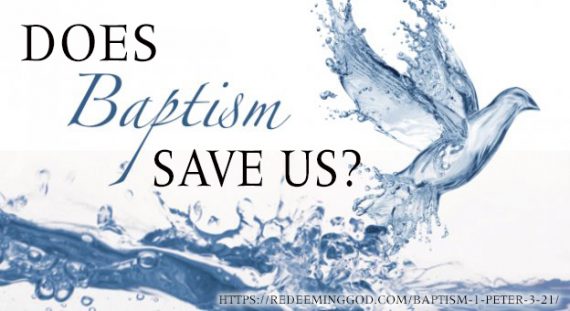When people read 1 Peter 3:21, they wonder if baptism is necessary for salvation. And this is indeed what 1 Peter 3:21 seems to say:
There is also an antitype which now saves us—baptism (not the removal of the filth of the flesh, but the answer of a good conscience toward God), through the resurrection of Jesus Christ (1 Peter 3:21).
So does baptism save us? Yes! According to Peter, it does.
But hold on … Isn’t baptism a work? Isn’t baptism something we do? Yes, it is.
So if baptism saves us, how can it be true that eternal life is received by faith alone in Jesus Christ alone, apart from works?
The solution is relatively simple, once you understand it.
 The solution to understanding 1 Peter 3:21 is to properly define the words “baptism” and “saves.” I define both of these terms in my online course, “The Gospel Dictionary.”
The solution to understanding 1 Peter 3:21 is to properly define the words “baptism” and “saves.” I define both of these terms in my online course, “The Gospel Dictionary.”
This post will briefly summarize how to understand the words “baptism” and “save.” More detailed explanations are found inside the course.
The meaning of the word “save”
In Scripture, the word “save” (saved, salvation, Savior, etc) almost never means “gain eternal life so you can go to heaven when you die.” This is what most Christians think the word means, and this is how most Christians use this word, but the Bible does not support such a definition.
The word “saved” simply means “deliverance” and context determines what kind of deliverance is in view. You can be delivered from enemies, sickness, drowning, premature death, and a variety of other disasters.
Whenever you see the word “saved” in the Bible, stop and think about it. Substitute in the word “delivered” or “deliverance” and then look in the context to figure out what kind of deliverance is in view. Very rarely (if ever) will it refer to gaining eternal life and going to heaven when you die.
This truth right here is going to help you understand 1 Peter 3:21 in a whole new way. While Peter does teach that baptism saves us, a careful study of the context reveals that Peter is not talking about gaining eternal life and going to heaven when we die. He has something else in view.
But to see what Peter has in view, we first need to understand the meaning of the word “baptism.”
The meaning of the word “baptism” in 1 Peter 3:21
The word baptism has caused inordinate amounts of disagreement over the years.
 There was even a time when certain Christians were drowning other Christians over the question of baptism. During the Reformation, one group of Christians got so upset that others were doing baptism wrong, that they decided to baptize those other people to death by drowning them.
There was even a time when certain Christians were drowning other Christians over the question of baptism. During the Reformation, one group of Christians got so upset that others were doing baptism wrong, that they decided to baptize those other people to death by drowning them.
We don’t go this far today. Or do we?
While we may not drown people because of their views on baptism, it is not uncommon for one group of Christians to condemn another group of Christians to everlasting hell because the other group has a different view on baptism.
So we don’t drown them … but we do condemn them to everlasting punishment in hell.
Yeah … maybe things haven’t changed as much as we think.
So we argue and condemn people over the issue of infant baptism vs. adult baptism, baptism by sprinkling vs. baptism by immersion, and whether a person should be baptized in the name of Jesus vs. in the name of the Father, the Son, and the Holy Spirit.
And then we have this form of baptism which is almost child abuse …
Most of these contentious issues can be cleared up simply by properly understanding and defining the word baptism. Baptism is a Greek word which means “immersion” or “submersion.”
Many Bible teachers stop right there and say that the debate between sprinkling vs. immersion is solved. They argue that if the word baptisma means immersion, then clearly, all baptisms must be by immersion.
But it is not quite as simple as that. Although baptisma means immersion, this does not mean that every baptism requires immersion into water.
When all the data is considered, the Bible describes several different kinds of baptisms, and only two of them involve water.
Along with John’s baptism and new believer’s baptism (Acts 2:41; 8:36; 10:47-48; 18:8), there is baptism into Moses (1 Cor 10:2), baptism of the cup and crucifixion (Matt 20:22; Mark 10:38; Luke 12:50), baptism by the Holy Spirit (Acts 1:4-5; 11:16; Rom 6:3-4; 1 Cor 12:13; Gal 3:26-28; Eph 4:5), and baptism with the fire of judgment (Matt 3:11; 13:25; Luke 3:16).
If you were counting, there are seven different kinds of baptism. I have a handout in the Gospel Dictionary Lesson on Baptism which nicely summarizes these seven kinds of baptism.
So it is a vast oversimplification to say that all baptism must be by immersion in water.
In light of all this, while baptism means immersion, it does not necessarily imply water. One can get baptized, or immersed, into almost anything.
To be baptized means to be fully immersed into something so that what is being baptized is completely overtaken and overwhelmed by whatever it is being baptized into.
It means to be fully identified with something, to become one with it.

So what does 1 Peter 3:21 mean?
There are some who teach that both faith and baptism are necessary for justification. Those who teach this often use 1 Peter 3:21 as a proof text for their view.
But if we know that the word “saved” does not refer to “receiving eternal life” in the Bible, we understand that Peter is not writing about the necessity of getting baptized in order to receive eternal life, but is instead referring to some form of deliverance.
Several contextual keys clue us in to what Peter has in mind.
First, it should be obvious that Peter is not referring to believer’s baptism at all, for he indicates that this baptism he is writing about is “through the resurrection of Jesus Christ.” Numerous other Scriptures reveal that water baptism does not actually place us in Christ, but this is done only through Spirit baptism (cf. Rom 6:3-4; 1 Cor 12:13; Gal 3:26-28; Eph 4:5).
Second, while some think that Peter is referring to believer’s baptism because of the mention of water in 3:20, Peter clarifies in 3:21 that he is not talking about the outward washing of the flesh with water but the inner purification of a good conscience toward God, which is accomplished only through the Spirit.
Finally, it should be noted that although 1 Peter 3:21 talks about how Noah and his family “were saved through water,” we should not take this to mean that the water was the instrument or means by which they were delivered from the flood. Far from it!
They were not delivered by the water; they were delivered from the water by the ark. Noah and his family passed through the waters and were delivered from the waters just as some pass through the fire, and are delivered from it.
So you take all this together, and Peter’s point is that just the ark delivered Noah and his family through the waters of the flood which threatened to take their life, so also, we too are delivered from the flood of sin that surrounds us, not by water, but by the Spirit of God (1 Peter 3:18). How? By fully immersing ourselves and identifying with the death and resurrection of Jesus Christ (1 Peter 3:18, 21).
Peter is teaching a sanctification truth. If you want to avoid have your life ruined by sin, Peter says, then learn what it means to have died to sin in Jesus Christ, and to have been raised to new life through His resurrection.
Jesus is the ark that saves us from the flood of sin that surrounds us. If you want to be delivered from the devastating and destructive consequences of sin (see Sin), then you need to follow the ways, teachings, examples, and instructions of Jesus, and especially what He showed us through His death, burial, and resurrection.
So Peter is not saying that you have to get dunked under water in order to go to heaven when you die. That is not his point at all!
In 1 Peter 3:21, Peter is not writing about how to gain eternal life. Instead, Peter is writing about how to live the Christian life.
He writes that the best way to live free from sin like Jesus Christ is to identify with Jesus and follow Him in every way we can.
 Want to learn more about the gospel? Take my new course, "The Gospel According to Scripture."
Want to learn more about the gospel? Take my new course, "The Gospel According to Scripture."
The entire course is free for those who join my online Discipleship group here on RedeemingGod.com. I can't wait to see you inside the course!
Here is a short video that summarizes the ideas in this post:







